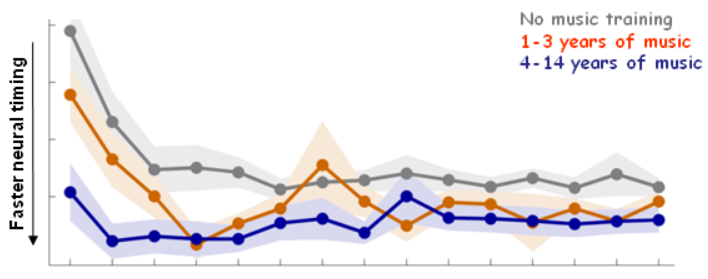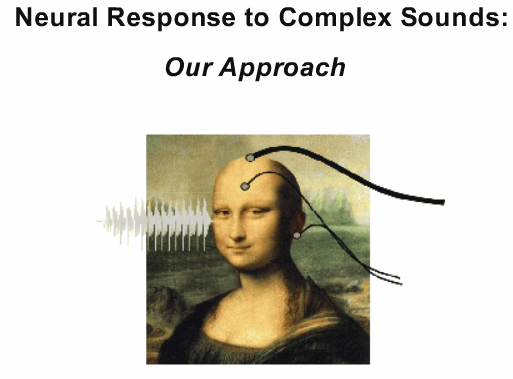Just a few years of early musical training benefits the brain later in life
November 7, 2013
[+]
Older adults who took music lessons as children but haven’t actively
played an instrument in decades have a faster brain response to a speech
sound than individuals who never played an instrument, according to a
new study by Northwestern University researchers.
(Credit: Auditory Neuroscience Laboratory)
They found that the more years study participants spent playing instruments as youth, the faster their brains responded to a speech sound.
As people grow older, they often experience changes in the brain that compromise hearing. For instance, the brains of older adults show a slower response to fast-changing sounds, which is important for interpreting speech.
For the study, 44 healthy adults, ages 55-76, listened to a synthesized speech syllable (“da”) while researchers measured electrical activity in the auditory brainstem. This region of the brain processes sound and is a hub for cognitive, sensory, and reward information.
The researchers discovered that, despite none of the study participants having played an instrument in nearly 40 years, the participants who completed 4–14 years of music training early in life had the fastest response to the speech sound (on the order of a millisecond faster than those without music training).
[+]
“Being a millisecond faster may not seem like much, but the brain is
very sensitive to timing and a millisecond compounded over millions of
neurons can make a real difference in the lives of older adults,”
explained Michael Kilgard, PhD, who studies how the brain processes
sound at the University of Texas at Dallas and was not involved in this
study.
(Credit: Auditory Neuroscience Laboratory)
“This study suggests the importance of music education for children today and for healthy aging decades from now,” researcher Dr. Nina Kraus said. “The fact that musical training in childhood affected the timing of the response to speech in older adults in our study is especially telling because neural timing is the first to go in the aging adult.”
This research was funded by the National Institutes of Health, the Hugh Knowles Center, and Northwestern University.

Click image for fascinating movie demonstrating how brainwaves sound eerily like the sounds we hear (credit: Auditory Neuroscience Laboratory)
Abstract of The Journal of Neuroscience paper
Aging results in pervasive declines in nervous system function. In the auditory system, these declines include neural timing delays in response to fast-changing speech elements; this causes older adults to experience difficulty understanding speech, especially in challenging listening environments. These age-related declines are not inevitable, however: older adults with a lifetime of music training do not exhibit neural timing delays. Yet many people play an instrument for a few years without making a lifelong commitment. Here, we examined neural timing in a group of human older adults who had nominal amounts of music training early in life, but who had not played an instrument for decades. We found that a moderate amount (4–14 years) of music training early in life is associated with faster neural timing in response to speech later in life, long after training stopped (>40 years). We suggest that early music training sets the stage for subsequent interactions with sound. These experiences may interact over time to sustain sharpened neural processing in central auditory nuclei well into older age.
(¯`*• Global Source and/or more resources at http://goo.gl/zvSV7 │ www.Future-Observatory.blogspot.com and on LinkeIn Group's "Becoming Aware of the Futures" at http://goo.gl/8qKBbK │ @SciCzar │ Point of Contact: www.linkedin.com/in/AndresAgostini
 Washington
Washington